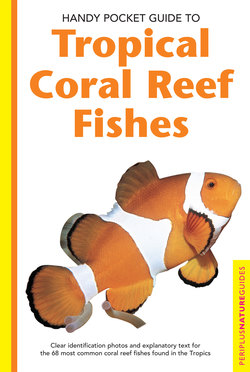Читать книгу Handy Pocket Guide to Tropical Coral Reef Fishes - Gerald Allen - Страница 5
ОглавлениеIntroduction
Fishes are by far the most abundant group of vertebrates—approximately 24,000 species inhabit fresh and marine waters. They are also the oldest backboned animals, having evolved in ancient seas nearly 500 million years ago. An incredible variety of habitats are populated by fishes—virtually every conceivable aquatic environment, from deep ocean trenches to high alpine streams. The group is so diverse it is difficult to define them, but most breathe by means of gills, have a protective layer of scales, and propel themselves through water (a medium that is 800 times denser than air) by means of fins. However, there are numerous exceptions—eels, for example, usually lack scales and have either much reduced fins or none at all.
Warm, clear seas of the Indo-Pacific, the vast region stretching between East Africa and the islands of Polynesia, have nurtured the development of nature's richest realm—the living coral reef. This region, centred on the Indonesian-Philippine Archipelago, is the world's most extraordinary biological province. Nowhere else can one find such a wealth of colourful and diverse marine life. More than half of the world's total fishes are found in this region. They range in size from the gargantuan, 12-metre-long Whale shark to diminutive gobies that are smaller than one's fingernail.
Except for a relatively small number of locally or regionally restricted species, known as endemics, most fishes in the Indo-Pacific have broad distributions—in many cases ranging all the way from Africa to Polynesia. Their broad dispersal is the result of the pelagic larval stage common to most reef fishes, in which the tiny young are propelled through surface waters by winds, waves and currents. The end result is a closely interrelated community of fishes inhabiting the length and breadth of the Indo-Pacific region. This is clearly an advantage for anyone wishing to learn the fishes of different localities within this vast area. Nearly all families, most genera and many species will be the same regardless of whether you are at Tahiti, Indonesia or the Maldive Islands.
The tremendous abundance of fishes seen during a single scuba dive or snorkeling session may seem staggering. Indeed, in some areas one can find as many as 300 species inhabiting only one or two hectares of reef. But there is no need to despair. This Periplus Nature Guide is an excellent introduction to the reef's most commonly encountered species. The entries are grouped according to family, and arranged in conventional taxonomic order. An index which includes both common and scientific names can be found at the end of the book. Fish watching is the aquatic counterpart of bird and butterfly watching. Almost anyone can enjoy this enriching hobby. The only essential equipment is a mask and snorkel, although of swim fins are also a good investment. Every fish that you encounter has an interesting story to tell about its unique habits and special way of life.
